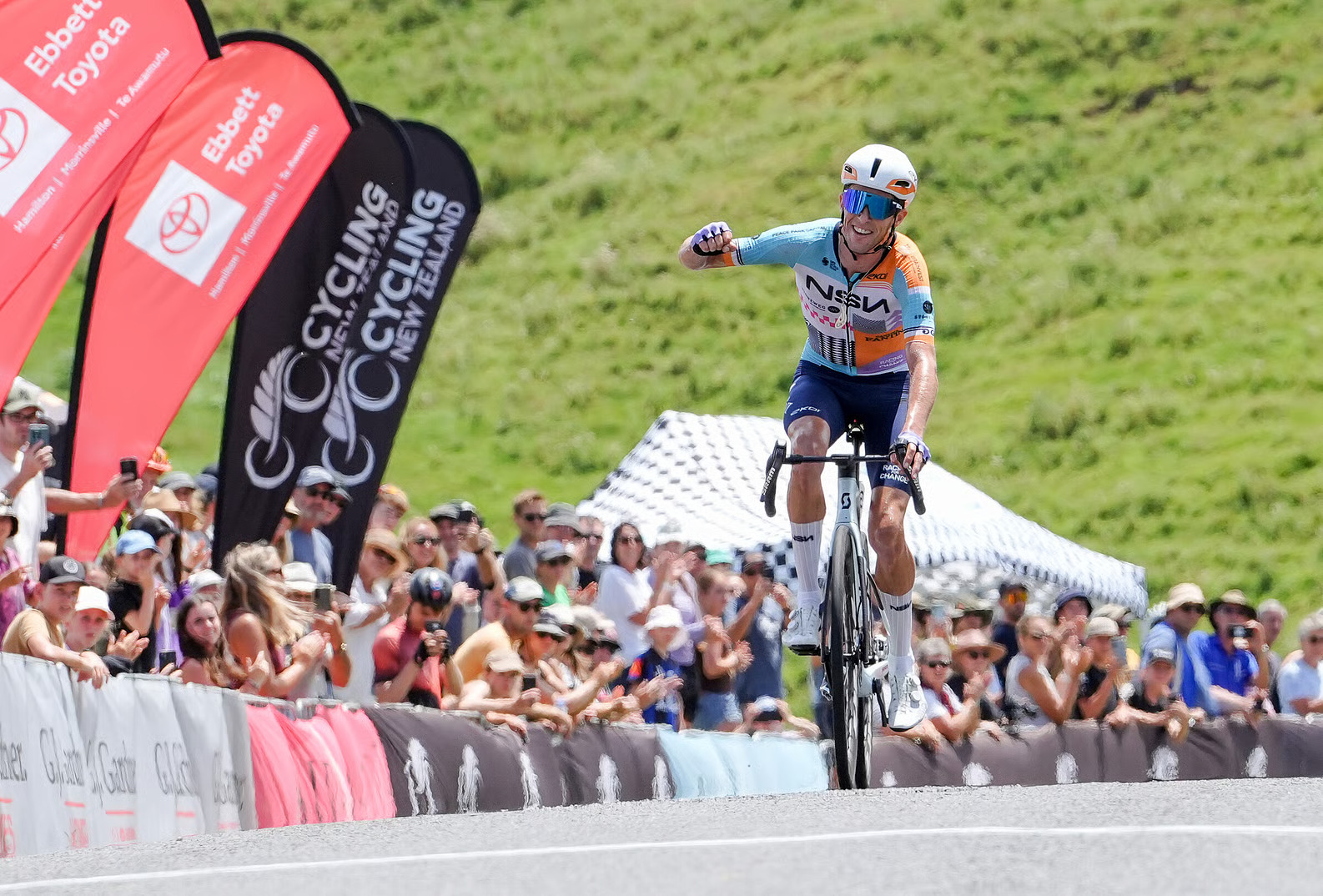Exclusive: Cookson says Astana are drinking in the last chance saloon
UCI President says WorldTour licence decision followed rules
The latest race content, interviews, features, reviews and expert buying guides, direct to your inbox!
You are now subscribed
Your newsletter sign-up was successful
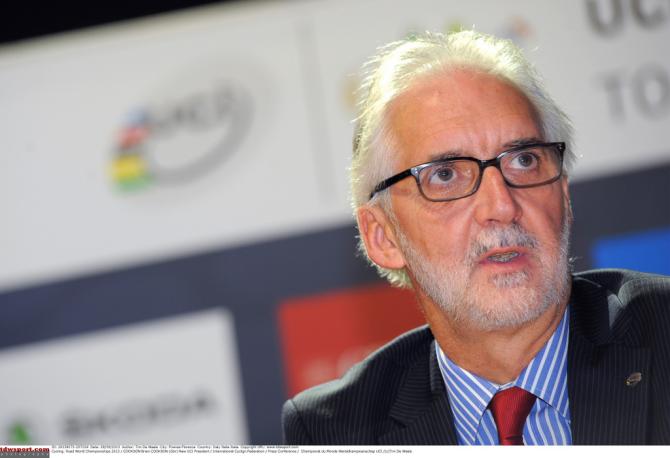
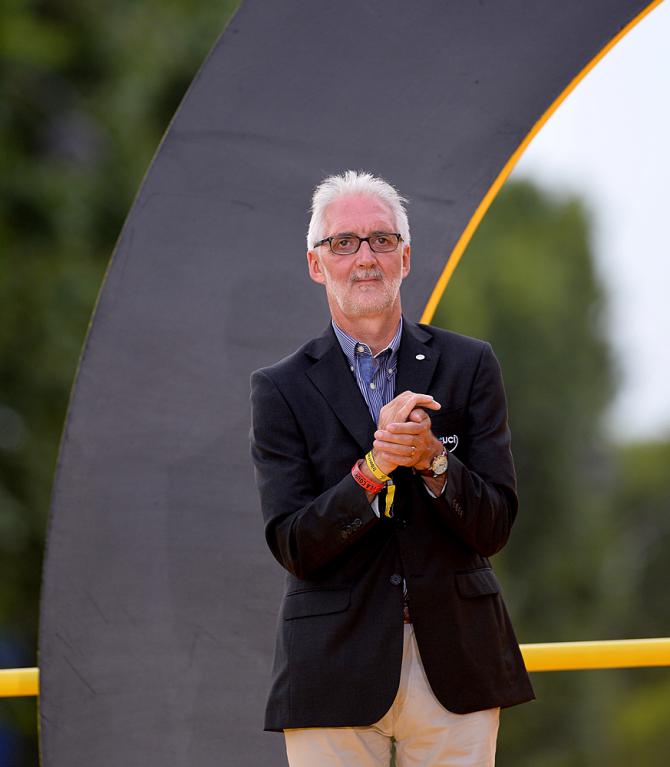
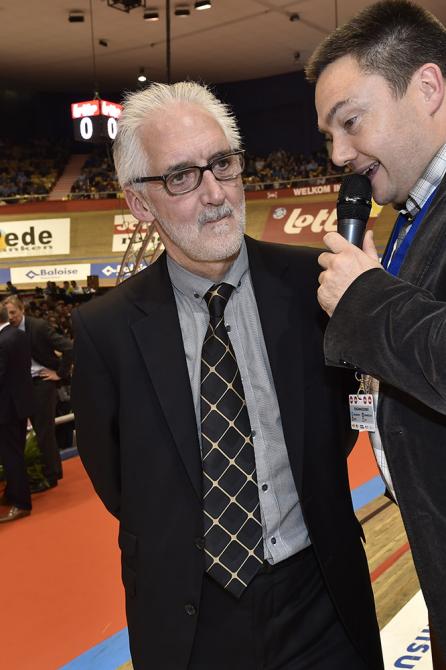
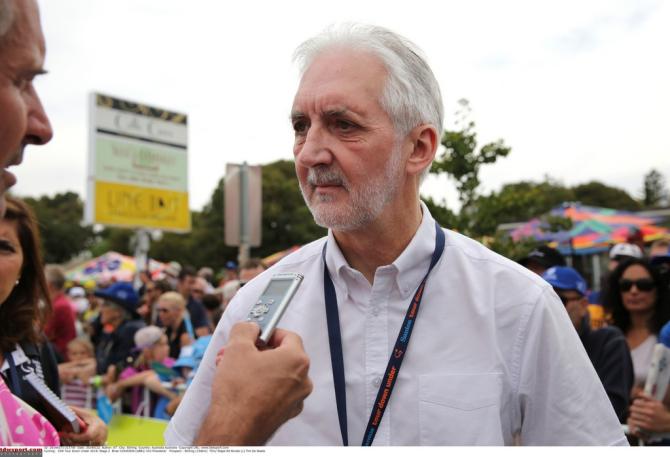
UCI President Brian Cookson has defended the decision to give the Astana team a WorldTour licence for 2015, telling Cyclingnews in an exclusive interview that another doping case within the Kazakhstani squad would be fatal for their survival, describing the team as "drinking in the last chance saloon.”
Cookson has faced fierce criticism after the UCI announced the decision of its Licence Commission late on Wednesday night. He described today as “the most frustrating day of his presidency” as he tried to justify the decision. He insisted that the Astana case in an on-going saga and that the team will race under probation in 2015.
Cookson stopped short of describing the Astana team manager Alexandre Vinokourov as a toxic influence on professional cycling but he urged Vinokourov to speak about his own doping to the Cycling Independent Reform Commission (CIRC) and “take his responsibilities for cleaning up the sport seriously.”
He said he intends to change the ethics rules of the UCI WorldTour after the conclusion of the CIRC investigation into doping expected in the spring of 2015.
Cyclingnews: What's your personal reaction to the news that Astana have been granted a WorldTour Licence, and are you happy that Astana is part of the WorldTour?
Brian Cookson: I think that you would be surprised if I was happy and I'm certainly not happy. It is a very frustrating time for all of us but we have to abide by the procedures that are laid down. I think that the Licence Commission did its work thoroughly and professionally and, I emphasise, independently of the UCI. We are happy and support the decision in that sense but I think that we have to bear in mind that this is an ongoing saga.
The Licence Commission have so far only been able to take into account the information that they had available to them at the time. More information seems to be emerging day-by-day, in particular the report that has gone to CONI. We have asked CONI for that report. We haven't got it yet. When we do we may well refer the team back to the Licence Commission. This is certainly not the time for anyone to be happy and proud. I'm very disturbed by the reaction of the team. There are certainly many important questions for them to answer in the future. As I've said already, they should consider themselves very much on probation.
The latest race content, interviews, features, reviews and expert buying guides, direct to your inbox!
CN: Was there ever the option of appealing the decision of the Licence Commission?
BC: I think what we've got is an ongoing situation. We've agreed to delegate this function to the Licence Commission some years ago and I think that it is important that we stick to that procedure. They have done their work very effectively with the information that is available to them. When new information emerges, then that can be referred back to them. We've got to remember that we had the case of another team two years ago [ed. Katusha] where the situation arose and they were successful in their appeal to CAS. I'm determined that, in this case, we get all of our procedures correct, that we get everything lined up in the right order and we do everything correctly. When new information comes out we will look at the situation again and we will certainly be looking at the situation again.
I'm not happy about the current situation, this isn't the end of the story, and let's see what happens as new information comes to us. But we have to confirm factual information and evidence. Neither the UCI nor the Licence Commission can base disciplinary action of this serious of nature on newspaper reports.
CN: Is there a problem with the ethics regulations, and are they strong enough? There have been two cases of doping on the team, you have Vinokourov who is totally unrepentant and the team still have a licence. How do you decide?
BC: I think the rules are clear in the sense they are in black and white but I understand what you are saying. One of the issues is that we have an ongoing problem in our sport with entourage and people inside the team who have a history and back story in doping and problems of an ethical nature. This is something that I have asked the Cycling Independent Reform Commission to look at and make recommendations. One of the things I want to get out of that is that we find a way of assessing who is a fit and proper person to be involved in our sport. This is something that the new WADA code from 2015 will help us with, this principal of association with undesirable people, if I can put it that way.
It is something that we can do much better in the future, if we have the tools. We don't have those tools at the moment so we are faced with sticking with the rules and procedures as they are, and that is what we are doing. This is not the end of the story and the team still have to answer to some very serious allegations that are still to be taken into account by the Licence Commission.
CN: Will you change the rules?
BC: I think what comes out of the Independent Reform Commission (CIRC) is going to be very important in setting a new standard in the way in which professional teams are managed and run. I think that the work that is coming out of the reforms in pro cycling will tie in with that. People are determined to cheat and that is where the fault lies. People can try and cheat any system and our job is to try and stop them from doing that, and that is what we're trying to do.
CN: On an ethical stand point, what would Astana have had to do in terms of doping cases to have their licence revoked? Would it take four positives, five, six, for example?
BC: I think that you have to bear in mind that the three cases from the Continental team couldn't be taken into account. We do have the case of the stagiaire rider, which is something that is serious. Essentially this is an assessment that the Licence Commission have to make on each case, and I would suggest that an additional doping case within the Astana team would be very critical to them. I would like to emphasise that the team is very much on probation and there isn't a second chance.
CN: But what does probation mean? If there is another case, there are still no rules to back you up if you had to take the licence away.
BC: I think that it is quite clear that another doping case for the Astana Pro team could be fatal to them. I think that, in effect, they are drinking in the last chance saloon.
CN: But it doesn't say that in the UCI rules.
BC: That is one of the difficulties that we face. Traditionally the regulations haven't been linked to team sanctions, not just in our sport but in all sports. That is something that the new WADA code will allow us to address more effectively.
CN: Could you remove the people in charge of the team?
BC: I think that is not an issue for me, I think that the leadership of the team should be an issue for the managers, sponsors and the Kazakhstan cycling federation. I must say that I think the reputation of Kazakhstan Cycling is very much in the balance. I know that there are very good people in the Kazakhstan cycling federation, as I'm sure there are in Astana Pro Team and I will support them and I'm sure that they will take the right action in terms of how their team is managed.
CN: When you came into the presidency and again in the press release last week, you spoke about restoring the credibility of the sport. How does this decision over Astana sit with you personally? It seems like you've followed the letter of the law rather than the morality behind it.
BC: I'd say that this is possibly the most frustrating day of my presidency, I would certainly have liked to have been in a position to take firmer action, however, I do think above all else it's absolutely vital we stick to procedure, we do things in the correct way, we follow WADA's rules and everybody else's rules of procedure so we have a defensible position.
It would have been counter-productive at this stage to take a decision which could have led us back to CAS. Rather than going around and around in circles, we want to take action in the right place and at the right time. Sometimes this can be frustrating. It's a very frustrating time for me personally but I believe we can get to the correct solution and I'm determined to continue the fight to try to clean up our sport. It does feel like one step backwards and one step forwards, and we won't get there unless we do things in the correct way.
CN: Could you have done this sooner? Given that we all knew the rules last week, why did this take another week before you issued the statement?
BC: The rules are the rules but we had to wait for the Licence Commission to deliver its report to us and that was only received at 9pm yesterday. It was absolutely vital that my colleagues prepared a press release that was legally correct and that took some time. I think if we could do anything better in the future, it would be to manage the time frames a little better. But again, we'd have to do things in the right way and not make up the rules as we go along. I think for a sustainable, defensible legal position, that's all absolutely essential.
CN: Vincenzo Nibali has defended Astana's credibility, and says there are other teams similar to Astana. Do you agree or is Astana an isolated case?
BC: Well I think there are still elements that are still resisting the movement towards improving the image and realities of doping in our sport. There are some toxic influences still around and they are going to take some time to clean out. We are making steps - we're moving things in the right direction. We have better tools like the biological passport and the new WADA code and so on. I'm absolutely determined that a) we'll continue that and b) we won't damage it by taking the wrong action at the wrong time in a way that puts us into a situation where we would be challenged [legally – ed.] and lose. That would undermine all of the progress that we are making at the moment.
CN: You mentioned toxic influences. Is Alexandre Vinokourov, the head of the Astana team, a toxic influence on cycling?
BC: I think I would have to choose my words more carefully than that and I would say that I think the leadership of the Astana team and the leadership of all teams need to take their responsibility towards cleaning up cycling as seriously as possible. The new environment we are trying very hard to establish in our sport needs the support of everyone in our sport if it's going to succeed.
CN: Would it make a difference to your opinion of Vinokourov if he were to talk to CIRC? I think in previous statements he has said that it wouldn't be an option.
BC: I think it's absolutely essential that Vinokourov and all others with history of doping problems go and talk to CIRC and do so as quickly as possible. Time is running out. I've said on a number of occasions that it's absolutely vital. If people want reconciliation we have to have truth first.
Evidence on Ferrari yet to reach UCI
CN: About the Padova evidence, are you getting the full dossier of 500 pages from CONI?
BC: We've asked for it, we haven't received it yet.
CN: Doesn't CONI have to act first and hold some disciplinary hearings? The whole police investigation isn't formally closed yet either and nobody's been charged yet…
BC: That's one of the most frustrating aspects of all this, these things take so much time, and we've seen that with Operacion Puerto in Spain. These things take a very long time to go through due process when there are elements of criminality to be taken into account. However, if we do see hard evidence that can impact on the status of a team or a rider then we will take action notwithstanding the final outcome of longstanding investigations involving the police or others. I think we can act quicker than that but we really need to see that documentation. The UCI needs to see it and refer it to the Licence Commission, and go through due process so that we don't lose a case like that on appeal to CAS.
CN: Some of the new reports in Gazzetta dello Sport today suggest that riders used image rights from contracts to pay Ferrari. If it emerged that there were links between several Astana riders and Ferrari would that be enough to refer the case back to Licence Commission?
BC: I think this is a very serious allegation. Mr. Ferrari is someone who is banned from involvement with teams and riders by CONI and USADA and so on. Certainly, proving association with him currently or recently or since his ban would be very, very serious.
CN: The Padova inquiry reveals what we could call ‘financial doping,' with riders perhaps attempting to avoid paying tax by having image rights paid into accounts in Switzerland and then using that black money as slush funds to pay people like Ferrari for doping. Is that something the UCI should be looking at as well? That's about ethics and contracts too…
BC: Absolutely. This is one of the reasons why we've established the Licence Commission and why they have those criteria. I've said on a number of occasions that doping is not a problem just for the individual riders or even for the teams when these things happen. Modern doping, from what I understand, is not just about taking a little pill behind the changing rooms or whatever – it's sophisticated, quasi-medical procedures. You're talking about supply chains, you're talking about money laundering and you're getting into areas of criminality. This is why things have to be done properly, you have to follow due process and involve the right criminal and civil authorities in many cases. This is not something the UCI can solve on its own but it something that we are determined to play our part in and to do that as seriously as possible.
These webs and devious systems of paying riders and avoiding tax and using that money to pay for doping are frankly despicable and very damaging for our sport. We have to try and find ways of working with the various tax, criminal and civil authorities. But at the end of the day this is something that people are deciding to do for themselves. If they really want to clean up our sport these people a) should stop it or b) if they're aware of it and unhappy about it, they should whistle-blow. There are plenty of opportunities for people to come and give us evidence about various activities. We all have to address our personal responsibilities in these situations.
Support for whistle-blowers
CN: Regarding whistle-blowers, are you surprised by the lack of response from the peloton and teams about Astana and linking to Dr. Ferrari? We saw a reaction from Pete Kennaugh but the rest of the cycling community seems very quiet at the moment. What do you say to the clean athletes out there who are doing the right thing and riding clean?
BC: I think it's very frustrating when we're not supporting clean athletes as we might do. I can understand the frustration of any rider who expresses their point of view. I'm happy to hear it and disappointed not to hear more of it. But I understand the riders are uncomfortable about speaking out. If any rider or any member of a team entourage has any information on their team, or any other team that is breaking the rules, they should tell us about it and we will support them on that.
CN: Where are you on disciplining the Astana team over missing the Tour of Beijing after they self-suspended to follow the rules of the MPCC?
BC: We have the report of the disciplinary commission and we will be acting upon that shortly. They will be fined for not participation in the Tour of Beijing. We will announce that shortly.
